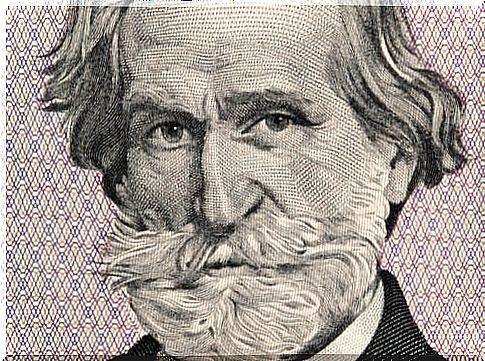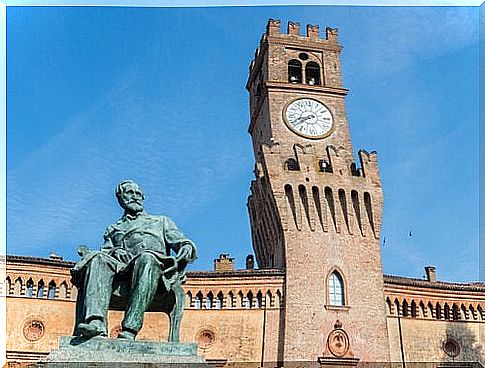The celebrated musician and composer Giuseppe Verdi had an extraordinary talent. In addition to his work in music, he was a man of many gifts and lived his life with probity, generosity and strength. His artistic and moral legacy ensured him an undisputed place in universal history.
Parma, the birthplace of Verdi, was a territory successively granted to Napoleon, the Habsburgs and the Bourbons until the year 1860, when it became part of the new Kingdom of Italy.
Amidst the situation of political instability that was experienced in Italy, Verdi, armed solely with his music, managed to contribute to the unification of the country. Excerpts from his operas served and still serve today to enhance the nationalist personality of the Italian people.
Uniquely for his historical moment, Verdi composed not thinking of privileged groups in society at the time, but for the masses. His compositions had a cornerstone of the passions of humanity, extreme feelings like love, hate, jealousy and fear.

First years
Giuseppe Fortunino Francesco Verdi was born on October 10, 1813 in Roncole, a village in Parma, Italy. Born in a humble home; his father, Carlo Giuseppe Verdi, worked at an inn; his mother, Luisa Utinni, was a weaver. Little Verdi grew up in a wild and rural environment.
At the age of eight, because of his fascination with music, his father presented him with an old harpsichord. This instrument was restored specifically for him and Giuseppe spent hours practicing. He was a gifted child, and his enormous talent was discovered by the trader Antonio Barezzi, who became his protector.
At just twelve years old, young Verdi moved to Busseto, to live in Barezzi’s house. The merchant would be in charge of providing the young man with the best possible musical training. During this period, he met his teacher Ferdinando Provesi.
Giuseppe Verdi: the desolation of his youth
When he turned 18, thanks to the help of his benefactor, Giuseppe Verdi changed residence again. On this occasion, Milan would be the city that the young musician would choose. Verdi was looking forward to taking the entrance exam at the city’s conservatory. However, the prestigious school did not admit the young man, as he was too old to enter the conservatory.
Added to this incident was the peculiarity of Verdi and his unorthodox way of playing the piano. Ironically, nowadays, the Milan Conservatory, the same one that did not admit it in its youth, takes the name of Verdi. This happened shortly after his death, against the wishes of the famous musician.
In 1836, at the age of 23, Verdi married the daughter of his benefactor, Margherita Barezzi. The marriage produced two children. However, they had to face the loss of both children very early, as they died when they were approximately one year old.
During this period, the young Verdi found himself leading the Philharmonic Society of Busseto and giving private lessons, tasks that he combined with his work in his masterpiece, Oberto.
In 1839, his first work had not yet been released, so he decided to return to Milan to deal with Scala and manage its release. Oberto debuted with relative success and had 14 performances. As a result, Verdi signed a contract at Scala to premiere three more works.
These were difficult years for the conductor; on June 18, 1840, Margherita died of encephalitis at just 26 years of age. Despite his suffering, Verdi was forced to fulfill his contract.
Under these circumstances, he wrote his second work, Un Giorno di Regno , a comic opera. The work premiered on September 5, 1840, but was a complete failure and was dropped from the scene. Heartbroken, he considered abandoning his career.
recovering a broken heart
Fortunately, Verdi recovered and resumed writing. Under the political circumstances of a divided and oppressed country, Nabucco’s book managed to ignite a new flame of composition in Verdi’s heart.
The work was premiered in Scala, in 1842, and its triumph, on that occasion, was huge. The masses hopelessly felt identified with the conflict recreated in the drama.
From Nabucco onwards , Verdi, who had previously been execrated by Milan society, consecrated himself as a composer and as an icon of the Italian struggle for the unification of the country. The masses appropriated the “Va, pensiero”, broadcast throughout the nation as a chant of resistance, the “anthem of resurgence”.
The first masterpieces and the climax of his career
In 1851, he premiered his first masterpiece: Rigoletto. This success was followed, two years later, by II Trovatore and La Traviata. In light of his consolidation as a composer, Verdi focused on satisfying his own musical inclination. From then on, his works sought dramatic certainty about musical conservatism.
The composer’s search expression is exemplified in his work Aida (1871), a piece that has more careful instrumentation and in which shorter and more integrated arias are appreciated; in other words, it has less segmentation between movements.
From this moment on, Verdi will begin his retirement as a composer, although he will compose some other immortal works based on Shakespeare’s texts: Otello and Falstaff.
Death and legacy of Giuseppe Verdi
At 84, Verdi buried his second wife, Giuseppina, who died on November 14, 1897 after spending several months suffering from bronchitis. The master stayed at their home, in the Sant’Agata village, where he devoted himself to fieldwork.
On a trip to Milan, Giuseppe Verdi suffered a stroke that caused his death on January 27, 1901. His death moved the country and society, and the expressions of respect and pain at his death were massive.

Verdi left his fortune to the house of retired musicians that he founded to house musicians in a situation of destitution : the Casa di Riposo per Musicisti. According to his will, his body and that of his wife lie there.
This house is still working today; it is a kind of residence for elderly people who have dedicated themselves to music. A place where music springs from every corner, where former opera figures are enjoying their retirement, and of which Verdi was very proud.
Few composers were able to write operas of political philosophy, but Verdi was an exception, making him a universal character. The general public loved his work and he was one of the few authors who could enjoy success while still alive and obtain important financial benefits.
Critics attacked his operas for their themes of abuse, suicide and free love, but Verdi overcame the sorrows in his life and the barriers imposed by critics, managing to define his own parameters.
 rancha.xyz Be free to choose their own route to self-knowledge, health and balance of body and soul.
rancha.xyz Be free to choose their own route to self-knowledge, health and balance of body and soul.




